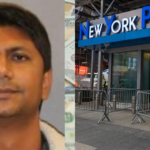Tuesday, January 7, 2025
Year : 2, Issue: 19
by Joyce Vance
We Can’t Forgive Crimes That Attack The Heart Of Our Democracy.
Four years after insurrectionists attacked the U.S. Capitol and attempted to overturn a free and fair election to keep a defeated candidate in power, that fundamental attack on our democracy is still not behind us. President-elect Donald Trump has said that one of his first acts after he’s inaugurated in two weeks will be to pardon his supporters who stormed the Capitol on Jan. 6, 2021.
“It’s going to start in the first hour,” Trump told TIME for their Person of the Year cover story. “Maybe the first nine minutes.”
Asked on NBC’s “Meet the Press” if he’d pardon even those who pleaded guilty, Trump replied, “I’m going to look at everything,” calling our judicial system “very corrupt.”
More than 1,570 Capitol rioters have been federally charged with crimes including assault and seditious conspiracy, and two-thirds of those have been convicted and sentenced, according to the latest Department of Justice figures. On the 2024 campaign trail, Trump described these insurrectionists as “great, great patriots” and “political prisoners,” conveniently ignoring that they were charged and prosecuted in the criminal justice system, indicted by grand juries, and convicted by judges and juries of federal crimes. His campaign embraced as an anthem “Justice for All,” a song recorded over the phone by imprisoned insurrectionists, set to the tune of “The Star Spangled Banner.”
U.S. presidents have broad powers under Article II, Section 2 of the Constitution to “grant Reprieves and Pardons for Offences against the United States,” excepting only “Cases of Impeachment.” The power to pardon crimes and commute sentences is unrestricted in any other way – except, perhaps, by the still-untested limitation on a president pardoning himself.
The pardon power was only included in the U.S. Constitution after extensive debate, and it was based on the English “prerogative of mercy” that allowed kings and queens to undo punishment deemed too harsh. It was never meant to reward political loyalty.
Jan. 6 was an attack on the Constitution and the country. Pardoning those convicted of plotting to prevent the lawful, peaceful transfer of power is not the kind of righteous grant of mercy that our founders had in mind. If Trump issues such pardons, he would put the presidential seal on crimes that attacked the heart of our democracy.
While these pardons would not violate the law per se or exceed a president’s power under the Constitution, it would nevertheless be an abuse of the clemency power that would violate the trust that Americans place in their leaders. Two-thirds of Americans oppose such pardons, according to a December 2024 Washington Post poll.
The Jan. 6 defendants were captured on video attacking the Capitol while brandishing and using firearms, stun guns, flagpoles, fire extinguishers, bike racks, batons, a metal whip, office furniture, pepper spray, bear spray, a tomahawk ax, a hatchet, a hockey stick, knuckle gloves, a baseball bat, a massive Trump billboard, Trump flags, a pitchfork, pieces of lumber, crutches and even an explosive device. More than 140 police officers were injured and members of Congress fled the building in fear for their lives. What they did must not be whitewashed as a patriotic, nonviolent protest.
Few of the Jan. 6 defendants have shown remorse, and some have shown outright defiance. While he was handcuffed at his sentencing last month, rioter Philip Sean Grillo taunted the court, shouting, “Trump’s gonna pardon me anyways.”
Even worse would be if Trump pardons members of the Oath Keepers and the Proud Boys, two far-right anti-government militias, who were convicted of seditious conspiracy in connection with the insurrection. Pardoning them would give a boost to the white supremacist and domestic terror groups by sending these people back to their ranks, and would severely dampen the deterrent effect of our laws against future aggression.
Last month, U.S. District Court Judge Amit Mehta, who in 2023 sentenced Oath Keepers leader Stewart Rhodes to 18 years in prison for seditious conspiracy, called Rhodes “an ongoing threat and a peril to this country, to the republic and to the very fabric of our democracy” and pronounced the idea that the president-elect might pardon him “frightening.”
Jan. 6 defendants are well outside the mainstream of people for whom presidents typically use their pardon power. These are not people who committed nonviolent crimes and served significant portions of their sentence, earning a second chance to return to their communities as rehabilitated individuals.
By pardoning those whom he summoned to the Capitol, Trump makes clear that violence and violation of the law can be forgiven if it’s in service to him. The pardons would be personal in nature, a transaction between a president and those who rendered him a service. By pardoning people who supported him rather than the Constitution, Trump would be sending a message to people he is counting on to support him this go-round: If they protect him, he will take care of them.
It’s a message fit for a would-be authoritarian.
Joyce Vance is a senior fellow at the Brennan Center for Justice at New York University School of Law, and a distinguished professor of the practice of law at the University of Alabama School of Law. Previously, she served as the U.S. attorney for the Northern District of Alabama from 2009 to 2017. She is also a legal analyst for NBC and MSNBC and co-host of the legal podcasts “#SistersInLaw” and “Cafe Insider.”
This commentary is adapted from an article published by the Brennan Center, a nonpartisan law and policy institute. You can read the original article here.







